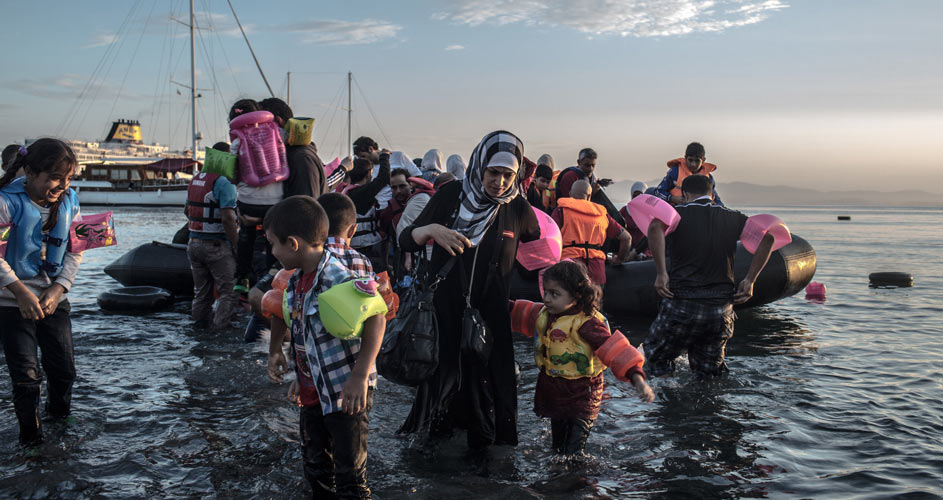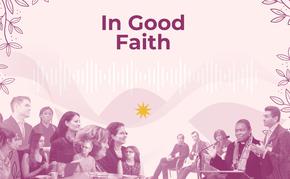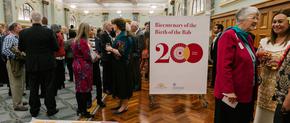The views expressed in our content reflect individual perspectives and do not represent the authoritative views of the Baha'i Faith.
Some call them refugees, others migrants. I prefer to call them human beings. – Omar Mahmoud, UNICEF
I’m an American citizen, born in Portland, Oregon in the United States—but I am a migrant.
My parents migrated from Oregon to Washington State, looking for work, when I was two years old. A decade later, at 12 years old, my father lost his job and had to find work elsewhere. We migrated to Arizona, where I went to middle school, high school and college. After my university years, I decided to migrate to California, where I still live today.
You might not think of crossing state lines as migrating, but I certainly do. We didn’t need passports to move across those borders, but when my family moved from central Washington to Arizona, a distance of a few thousand miles, the cultural differences amazed me. It felt like entering a new nation. I realized, as I studied history, that making the same trip a few hundred years before would have involved traveling across several tribal and international borders. Almost all of the people I met in Arizona spoke Spanish or had come to the state from somewhere else. Only the natives—the American Indians indigenous to the region—could say they weren’t migrants.
In some ways, we’re all migrants. Almost all of us have immigrated across a border sometime in our lives, or have ancestors who did. We became migrants because we needed to survive. We left our homes and the cultures we knew and understood, and sought a new home and a new culture. We did it so we could eat, or work, or educate ourselves, or give our children a better life, or escape wars and disasters. We had good reasons to migrate, and even though the journey and the ultimate destination both presented enormous, unknown hardships, we made the journey.
Today, according to the International Organization for Migration (IOM), approximately three million people are on the move as migrants somewhere in the world. Some make it to a safe destination, but lots of people don’t. The Universal Declaration of Human Rights says we all have the right to travel safely to any destination—but sadly, that’s not the reality yet. Every year, migrants lose their lives trying to save their lives.

Syrian migrants landing on the shores of Greece
Migration isn’t easy. People driven out of their homes by war or famine or political instability often fall victim to those terrible conditions before they even reach their own nation’s borders. Crime, human trafficking and the abuse by smugglers take a huge toll on migrants, who often have no way to protect themselves from predators. On land or on sea, nature itself presents enormous dangers. If they overcome those tremendous obstacles, migrants face governmental resistance, fear, prejudice and xenophobia. If they succeed in entering a welcoming country, they still encounter language and cultural barriers, poverty and privation, and all the major challenges of adapting to a foreign land.
On December 18 every year, the United Nations and the IOM observe International Migrants Day, designed to recognize the plight and the promise of all migrants, and to protect their human rights.
If you see someone wearing a white wristband that says “#IamaMigrant,” or if you see a group of people holding the first global candlelight vigil, you’ll recognize the commemoration of International Migrants Day. Designed to urge the international community to come together and remember the refugees and migrants who have tragically lost their lives this year, those wristbands and vigils also recognize the world’s responsibility to provide safe passage for people making arduous journeys to a new life. You can read about some of those lives here: www.iamamigrant.org The “I am a migrant” campaign creates a place for the personal stories of migrants that challenges the anti-migrant stereotypes and hate speech in politics and society.
“Each person,” the IOM’s official statement says, “has a name, a story and left their homelands seeking better opportunities and safety for themselves and in many cases for their families – aspirations that all of us strive for.” The IOM also says the global commemoration of International Migrant’s Day will help “shift the narrative of migration towards a positive recognition of the many ways migrants contribute to host societies.”
Baha’is care deeply about migrants. Baha’u’llah himself, in his exile from his native Persia, migrated to Baghdad in the Ottoman Empire; to Constantinople (now Istanbul) and Adrianople (now Edirne) in Turkey; to the prison city of Akka in Palestine (now Israel). Many Baha’is have been forced out of or fled their native countries because of persecution. Baha’is consider themselves world citizens, believe in the oneness of all humanity and encourage all people to travel to different countries and regions, experiencing the beautiful diversity of the world’s many rich cultures. The Baha’i teachings even compare migrants and homeless exiles to the prophets of God:
O ye homeless and wanderers in the Path of God! Prosperity, contentment, and freedom, however much desired and conducive to the gladness of the human heart, can in no wise compare with the trials of homelessness and adversity in the pathway of God; for such exile and banishment are blessed by the divine favour, and are surely followed by the mercy of Providence. The joy of tranquillity in one’s home, and the sweetness of freedom from all cares shall pass away, whilst the blessing of homelessness shall endure forever, and its far-reaching results shall be made manifest.
Abraham’s migration from His native land caused the bountiful gifts of the All-Glorious to be made manifest, and the setting of Canaan’s brightest star unfolded to the eyes the radiance of Joseph. The flight of Moses, the Prophet of Sinai, revealed the Flame of the Lord’s burning Fire, and the rise of Jesus breathed the breaths of the Holy Spirit into the world. The departure of Muhammad, the Beloved of God, from the city of His birth was the cause of the exaltation of God’s Holy Word, and the banishment of the Sacred Beauty [Baha’u’llah] led to the diffusion of the light of His divine Revelation throughout all regions.
Take ye good heed, O people of insight! – Abdu’l-Baha, Selections from the Writings of Abdu’l-Baha, pp. 280-281.
You May Also Like
Comments

















The question of migration inevitably leads us to a recognition that we live in a world of haves and have-nots, and ...the treatment we can reasonably expect is dependent on which category we fall into. Some people are called refugees. Others are called expats. We don't live in a world yet where first and foremost we are human beings.